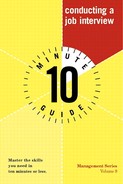In this lesson, you learn the value of constructively critiquing the interviews that you conduct to spot weaknesses and other difficulties that may need to be corrected.
The price of building and maintaining good interviewing skills and techniques is eternal vigilance. After each round of interviews, it helps to take a few minutes to critique the interview process to detect what went right and what may need improvement.
Here's a checklist covering each of the major tasks involved in the interview process. Use it to help spot weak areas and to reinforce strengths.
A thorough analysis of the vacant position was performed, and mandatory success factors were identified.
The immediate supervisor of the position was asked to describe any special factors that may be required to succeed in the job, including those imposed by the corporate culture.
An interview panel was assembled, consisting of all supervisors to whom the new employee will report, together with a peer or two from the department or unit in which the opening exists.
Panel members met at least once to thoroughly discuss the interview process.
A resumé review tool, such as the Resumé Review Grid, discussed in Lesson 2, "The Resumé," was developed and used as part of the preinterview screening process.
Resumés were screened by more than one person.
Applicants eliminated in the initial screening process were notified in writing.
Tip
Remember that just because an applicant was eliminated from further consideration for one job doesn't mean you'll never be interested in hiring them. The next opening in your organization may be a perfect match. So take the time to contact each unsuccessful applicant, thanking them for their interest, and encouraging them to apply again (unless, of course, the reason for their elimination is something that will disqualify them from being employed in any capacity with your firm.)
Specific concerns about information contained in resumés (See the section "Red Flags," in Lesson 2) were clearly flagged for further discussion with the candidate.
All candidates selected for further consideration were notified in writing and were asked to complete company employment application forms, which included a clause permitting you to contact any and all former employers as well as others with knowledge of the applicant's work history, and a hold harmless agreement permitting all references to release information about the applicant.
Tip
Be sure to ask your corporate attorney to periodically review your company's employment application to ensure that you have the proper legal authority to "network" references—that is, to ask each of them to provide a name of someone else who is familiar with the applicant's work.
Candidates were also asked to submit 10 "personal" references that included the names of former employers.
Behavioral questions and appropriate follow-up probes were developed for each of the mandatory success factors identified in the job review.
Any required testing was arranged for each candidate selected to be interviewed.
References were contacted prior to interviews.
Academic degrees were verified prior to interviews.
Interviews were scheduled in advance, and sufficient time was allocated for each interview.
Interviews were held in an area that was free from noise and interruption.
Panel members were briefed about the candidate before each interview and were given a copy of the candidate's resumé, together with the comments of reviewers who initially reviewed it.
Panel members were punctual and prepared for the interview process.
An attempt was made to put candidates at ease before each interview.
In the opening segment of the interview, candidates were told what to expect during the interview.
Candidates were asked to explain any questions raised in the initial review of their resumé.
The 80/20 rule was followed—the candidate did at least 80 percent of the talking.
Each member of the interview panel practiced active listening skills during the interviews.
Panel members maintained eye contact with each candidate.
The behavioral questions developed for each mandatory success factor were asked of all candidates interviewed.
Candidates were allowed sufficient time to answer questions.
Candidates were given verbal and nonverbal encouragement during the course of interviews.
The course of each interview was appropriately controlled.
Interviews were focused on mandatory success factors and didn't drift into areas not related to the position being sought.
Interview panel members took appropriate notes during the course of each interview.
At the end of each interview, candidates were told what comes next.
Candidates were given a positive impression of the company because one member of the interview panel took responsibility for "selling the company" to each candidate.
During the closing segment of the interview process, candidates were given an opportunity to ask questions about the job and the company.
Evaluations of candidates were completed immediately following each interview, using an appropriate evaluation tool (see Lesson 6, "Structured Behavioral Interviewing: Part 1." )
The candidate of choice was hired, with the decision being promptly communicated to all remaining candidates, or a short list of top candidates was developed.
Second interviews were scheduled for short-listed candidates utilizing alternative interview methods.
Feedback from those involved in second interview situations was evaluated.
The candidate of choice was hired, with the decision being promptly communicated to all remaining candidates.
Each part of the interview process is important. Whether you're new to structured behavioral interviewing or have been doing it for years, there's always room for improvement.
Make it a habit to regularly review the interview process and to make improvements whenever necessary. Continue to look for ways to develop your style of interviewing.
Critiquing interviews helps the manager to fine tune the interview process for maximum effectiveness.
Regardless of your personal experience with structured behavioral interview techniques, there's always room for improvement.
Checklists, similar to the one outlined in this lesson, are a good way to objectively review the interview process.
Remember that the objective is to find the best candidate for the job. So, retain and improve whatever process steps help accomplish that goal, and improve or eliminate whatever gets in the way of it.
